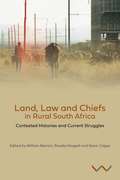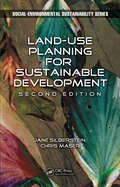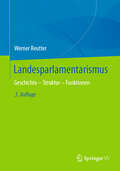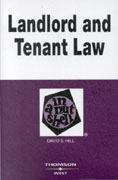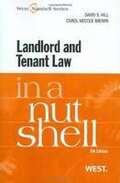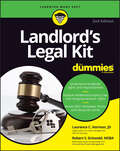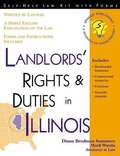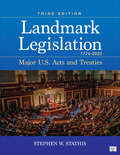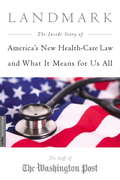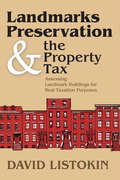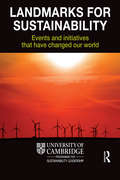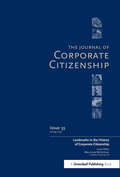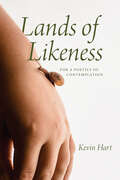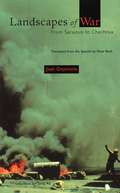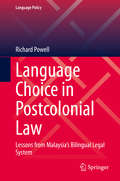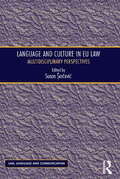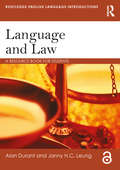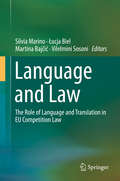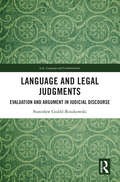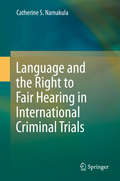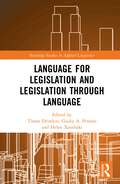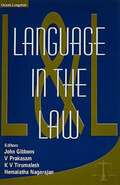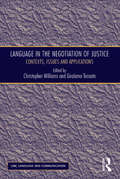- Table View
- List View
Land, Law and Chiefs in Rural South Africa: Contested histories and current struggles
by Gavin Capps Rosalie Kingwill William BeinhartThis edited collection illustrates contestations over land and political authority in South Africa’s rural areas, focusing on threats to popular rights and how they are being supported.
Land-Use Planning for Sustainable Development (Social Environmental Sustainability)
by Chris Maser Jane Silberstein M.A.Thirteen years ago, the first edition of Land-Use Planning for Sustainable Development examined the question: is the environmental doomsday scenario inevitable? It then presented the underlying concepts of sustainable land-use planning and an array of alternatives for modifying conventional planning for and regulation of the development of land. Th
Landesparlamentarismus: Geschichte - Struktur - Funktionen
by Werner ReutterDieser Band bietet eine Bestandsaufnahme der Funktionsweisen, der Aufgaben und der Stellung der Landesparlamente in den einzelnen Bundesländern. Er informiert über die historische Entwicklung und verfassungsrechtlichen Voraussetzungen der 16 Landesparlamente, stellt die jeweiligen Parteienlandschaften, das Wahlrecht und die Wahlergebnisse vor, analysiert die politische und soziale Zusammensetzung sowie die Struktur und Organisation der Landesparlamente und untersucht schließlich den Funktionswandel dieser Institutionen. Für die 3. Auflage wurde er umfassend aktualisiert und erweitert.
Landlord and Tenant Law in a Nutshell (4th Edition)
by David S. HillComprehensive guide provides expert explanation of the rules that govern the legal relations between landlords and tenants. Describes the exceptions to these rules and explores the underlying reasons for them. Reviews the creation, duration, and termination of several types of tenancies; terminating leases before expiration; repairs and improvements; transfers; extensions, renewals, and purchase options; rent and security; and insurance and taxes.
Landlord and Tenant Law in a Nutshell (Fifth Edition)
by David S. Hill Carol N. BrownComprehensive guide provides expert explanation of the rules that govern the legal relations between landlords and tenants. Describes the exceptions to these rules and explores the underlying reasons for them. Reviews the creation, duration, and termination of several types of tenancies; terminating leases before expiration; repairs and improvements; transfers; extensions, renewals, and purchase options; rent and security; and insurance and taxes.
Landlord's Legal Kit For Dummies
by Robert S. Griswold Laurence C. HarmonHowdy, landlord! Get on the right side of the law with Dummies Landlord's Legal Kit For Dummies contains all the resources landlords need to unpack the legal side of renting properties. Inside you'll find worksheets, templates, and friendly explanations that will help you find success. Once you have your property and your tenants, you'll need to make sure you operate within your rights, complete all the necessary admin, and handle taxes in an accurate and timely way. This book can help you do just that, with the latest paperwork, helpful details and examples, and a breakdown of taxes and laws. Plus, you can go beyond the book by accessing online documents that take your learning to the next level. Understand all the latest housing laws that pertain to your specific rental situation Find drafts of all the legal forms you&’ll need as a landlord Access easy-to-use tax worksheets and clear descriptions of tax rules without legal jargon Recognize your rights as a landlord and understand your tenants' rights This is the perfect Dummies guide for both new and experienced landlords who need a hands-on legal reference for all the laws surrounding rent, rental properties, and tenants.
Landlords' Rights and Duties in Illinois
by Diana Brodman Summers Mark WardaThis new release is the perfect resource for any residential or commercial landlord. Includes leases, evictions and Illinois-specific law. Learning about your rights and responsibilities could save you a bundle in legal fees!
Landmark Legislation 1774-2022: Major U.S. Acts and Treaties
by Stephen W. StathisLandmark Legislation 1774-2022, Third Edition is a comprehensive guide to important laws and treaties enacted by the U.S. Congress. This updated edition includes landmark legislation from the last five Congresses (2013-2022) on issues like climate change, criminal justice, education, and more. It features carefully selected acts and treaties with historical significance and has an updated index and bibliography for easy access. A must-have for public and academic libraries with American history or political science collections.
Landmark Legislation 1774-2022: Major U.S. Acts and Treaties
by Stephen W. StathisLandmark Legislation 1774-2022, Third Edition is a comprehensive guide to important laws and treaties enacted by the U.S. Congress. This updated edition includes landmark legislation from the last five Congresses (2013-2022) on issues like climate change, criminal justice, education, and more. It features carefully selected acts and treaties with historical significance and has an updated index and bibliography for easy access. A must-have for public and academic libraries with American history or political science collections.
Landmark: The Inside Story of America's New Health-Care Law-The Affordable Care Act-and What It Means for Us All
by The Staff of The Washington Post"The Washington Post"OCOs must-read guide to the health care overhaul What now? Despite the rancorous, divisive, year-long debate in Washington, many Americans still donOCOt understand what the historic overhaul of the health care system willOCoor wonOCOtOComean. In "Landmark," the national reporting staff of "The Washington Post" pierces through the confusion, examining the new lawOCOs likely impact on us all: our families, doctors, hospitals, health care providers, insurers, and other parts of a health care system that has grown to occupy one-sixth of the U. S. economy. "Landmark"OCOs behind-the-scenes narrative reveals how just how close the law came to defeat, as well as the compromises and deals that President Obama and his Democratic majority in Congress made in achieving what has eluded their predecessors for the past seventy-five years: A legislative package that expands and transforms American health care coverage. "Landmark" is an invaluable resource for anyone eager to understand the changes coming our way.
Landmarks Preservation and the Property Tax: Assessing Landmark Buildings for Real Taxation Purposes
by David ListokinHistoric preservation is an issue of growing importance and public commitment. Federal and state mechanisms have been established to identify and support historic buildings/sites, while local governments have been active in supporting and protecting historic resources. Communities across the country have established designation programs whereby individual buildings or districts of historical-architectural significance are accorded landmark status. Designation activity has been accompanied by growing interest in other local incentives/disincentives to the support of historic buildings. In this regard, the property tax is viewed as either a possible powerful drawback to or a catalyst of preservation. This study examines the relationship between historic preservation and the property tax, focusing on the question of how designated buildings should be assessed for real taxation purposes. Listokin focuses on New York City in considering the effects of historic status on property value and in evaluating assessment practices. But this book's findings are transferrable to other communities because the base conditions are similar. Many other cities have designation programs modeled on New York City's. In addition, New York's property-tax system and administrative processes resemble those found in communities across the nation. To enhance the transferability of this study's findings, Listokin refers to the national experience and literature, typically on a side-by-side basis with the New York City counterpart.
Landmarks for Sustainability: Events and Initiatives That Have Changed Our World
by Wayne VisserLandmarks for Sustainability is a high-impact, quick-reference guide to many of the most critical events and initiatives that have shaped our world, and the sustainable development agenda, over the past 20 years and more. These include high-profile historic events – such as the Exxon Valdez oil spill, the Rio Earth Summit, the anti-globalisation protests in Seattle and Genoa and the collapse of Enron – as well as more subtle but no less important developments, such as trends in fairtrade, ethical codes and sustainable investment. By shining a spotlight on these and other landmark events and initiatives, the book draws into sharp relief the most significant social and environmental challenges of our time – from climate change and the state of the planet to poverty and corruption. Equally importantly, however, more than half of the book is dedicated to constructive global responses, such as the boom in clean technology, the role of the World Economic and World Social Forums, and the growth of ISO 14001 and SA8000 standards. Each of the 20 chapters follows a similar easy-access full-colour design, with inspiring quotations, compelling photographs, a timeline of associated events, a narrative description of trends, and spotlight features of specific initiatives or events, including charts, factboxes and suggestions for further reading and websites. Also included is the world's most comprehensive sustainability timeline, listing and dating 190 key sustainability-related events and initiatives that occurred between 1919 and 2008. All these features combine to make the book an essential and highly accessible resource for managers, teachers, students, government officials, consultants and activists alike. For the first time, these crucial change agents will have a single-source reference book, which is not only packed with useful facts and figures, but is also fascinating to look at and full of inspirational material.
Landmarks in the History of Corporate Citizenship: A special theme issue of The Journal of Corporate Citizenship (Issue 33)
by Malcolm McIntoshThis is not a definitive history of corporate citizenship but for anyone interested in the who, what, why and how of this subject there are some very significant papers which may become definitive for scholars and reflective practitioners. Just as many people cannot imagine a world without mobile telephony and the Internet, and seem not to care or wonder how we got here, so too it is forgotten that much that is now taken for granted in terms of corporate reporting and accountability has been, and still is, the result of a hard struggle.
Lands of Likeness: For a Poetics of Contemplation
by Kevin HartAn original and profound exploration of contemplation from philosopher, theologian, and poet Kevin Hart. In Lands of Likeness, Kevin Hart develops a new hermeneutics of contemplation through a meditation on Christian thought and secular philosophy. Drawing on Kant, Schopenhauer, Coleridge, and Husserl, Hart first charts the emergence of contemplation in and beyond the Romantic era. Next, Hart shows this hermeneutic at work in poetry by Gerard Manley Hopkins, Marianne Moore, Wallace Stevens, and others. Delivered in its original form as the prestigious Gifford Lectures, Lands of Likeness is a revelatory meditation on contemplation for the modern world.
Lands of Likeness: For a Poetics of Contemplation
by Kevin HartAn original and profound exploration of contemplation from philosopher, theologian, and poet Kevin Hart. In Lands of Likeness, Kevin Hart develops a new hermeneutics of contemplation through a meditation on Christian thought and secular philosophy. Drawing on Kant, Schopenhauer, Coleridge, and Husserl, Hart first charts the emergence of contemplation in and beyond the Romantic era. Next, Hart shows this hermeneutic at work in poetry by Gerard Manley Hopkins, Marianne Moore, Wallace Stevens, and others. Delivered in its original form as the prestigious Gifford Lectures, Lands of Likeness is a revelatory meditation on contemplation for the modern world.
Landscapes of War: From Sarajevo to Chechnya
by Juan Goytisolo Peter BushAn incisive examination of the tensions that exist between the West and Islamic societies of Europe, North Africa, and the Middle East. Provides rich historical analysis and reportage of life in four explosive war-zones: Sarajevo, Algeria, the West Bank and Gaza, and Chechnya. Translated by Peter Bush.
Language Choice in Postcolonial Law: Lessons from Malaysia’s Bilingual Legal System (Language Policy #22)
by Richard PowellThis book discusses multilingual postcolonial common law, focusing on Malaysia’s efforts to shift the language of law from English to Malay, and weighing the pros and cons of planned language shift as a solution to language-based disadvantage before the law in jurisdictions where the majority of citizens lack proficiency in the traditional legal medium. Through analysis of legislation and policy documents, interviews with lawyers, law students and law lecturers, and observations of court proceedings and law lectures, the book reflects on what is entailed in changing the language of the law. It reviews the implications of societal bilingualism for postcolonial justice systems, and raises an important question for language planners to consider: if the language of the law is changed, what else about the law changes?
Language and Culture in EU Law: Multidisciplinary Perspectives (Law, Language and Communication)
by Susan ŠarčevićWritten by distinguished legal and linguistic scholars and practitioners from the EU institutions, the contributions in this volume provide multidisciplinary perspectives on the vital role of language and culture as key forces shaping the dynamics of EU law. The broad spectrum of topics sheds light on major Europeanization processes at work: the gradual creation of a neutralized EU legal language with uniform concepts, for example, in the DCFR and CESL, and the emergence of a European legal culture. The main focus is on EU multilingual lawmaking, with special emphasis on problems of legal translation and term formation in the multilingual and multicultural European context, including comparative law aspects and an analysis of the advantages and disadvantages of translating from a lingua franca. Of equal importance are issues relating to the multilingual interpretation of EU legislation and case law by the national courts and interpretative techniques of the CJEU, as well as the viability of the autonomy of EU legal concepts and the need for the professionalization of court interpreters Union-wide in response to Directive 2010/64/EU. Offering a good mix of theory and practice, this book is intended for scholars, practitioners and students with a special interest in the legal-linguistic aspects of EU law and their impact on old and new Member States and candidate countries as well.
Language and Law: A resource book for students (Routledge English Language Introductions)
by Alan Durant Janny HC LeungLanguage plays an essential role both in creating law and in governing its implementation. Providing an accessible and comprehensive introduction to this subject, Language and Law: describes the different registers and genres that make up spoken and written legal language and how they develop over time; analyses real-life examples drawn from court cases from different parts of the world, illustrating the varieties of English used in the courtroom by speakers occupying different roles; addresses the challenges presented to our notions of law and regulation by online communication; discusses the complex role of translation in bilingual and multilingual jurisdictions, including Hong Kong and Canada; and provides readings from key scholars in the discipline, including Lawrence Solan, Peter Goodrich, Marianne Constable, David Mellinkoff, and Chris Heffer. With a wide range of activities throughout, this accessible textbook is essential reading for anyone studying language and law or forensic linguistics. Sections A, B, and C of this book are freely available as a downloadable Open Access PDF under a Creative Commons Attribution-Non Commercial-No Derivatives 4.0 license available at http://www.taylorfrancis.com/books/e/9781315436258
Language and Law: The Role Of Language And Translation In Eu Competition Law
by Silvia Marino Łucja Biel Martina Bajčić Vilelmini SosoniThe book provides an overview of EU competition law with a focus on the main developments in Italy, Spain, Greece, Poland and Croatia and offers an in-depth analysis of the role of language, translation and multilingualism in its implementation and interpretation.The first part of the book focuses on the main developments in EU competition law in action, which includes legislation, case law and praxis. This part can be divided into two subparts: the private enforcement of EU competition law, and the cooperation among enforcers, i.e. the EU Commission, the national competition authorities and the national courts. Language is of paramount importance in the enforcement of EU competition law, and as such, the second part highlights legal linguistic skills, showcasing the advantages and the challenges of multilingualism, especially in the context of the predominant use of English as the EU drafting and vehicular language.The volume brings together contributions prepared and presented as part of the EU-funded research project “Training Action for Legal Practitioners: Linguistic Skills and Translation in EU Competition Law".
Language and Legal Judgments: Evaluation and Argument in Judicial Discourse (Law, Language and Communication)
by Stanisław Goźdź-RoszkowskiIntegrating research methods from Linguistics with contemporary Legal Argumentation Theory, this book highlights the complexities of legal justification by focusing on the role of value-laden language in argument construction and use. The combination of linguistic analysis and the pragma-dialectic approach to legal argumentation yields a new way of perceiving and understanding the phenomenon of evaluation, one that offers theoretical and practical gains. Analyzing a vast corpus of judicial opinions from the United States Supreme Court and Poland’s Constitutional Court, the book paints a clear picture of complex linguistic choices made by judges to assess and support arguments in the justifications of their decisions. The book will be of interest to scholars in Law, Linguistics and Rhetoric, as well as to judges and practicing lawyers engaged in the art of argumentation.
Language and the Right to Fair Hearing in International Criminal Trials
by Catherine S. NamakulaLanguage and the Right to Fair Hearing in International Criminal Trials explores the influence of the dynamic factor of language on trial fairness in international criminal proceedings. By means of empirical research and jurisprudential analysis, this book explores the implications that conducting a trial in more than one language can have for the right to fair trial. It reveals that the language debate is as old as international criminal justice, but due to misrepresentation of the status of language fair trial rights in international law, the debate has not yielded concrete reforms. Language is the core foundation for justice. It is the means through which the rights of the accused are secured and exercised. Linguistic complexities such as misunderstandings, translation errors and cultural distance among participants in international criminal trials affect courtroom communication, the presentation and the perception of the evidence, hence jeopardizing the foundations of a fair trial. The author concludes that language fair trial rights are priority rights situated in the minimum guarantees of fair criminal trial; the obligation of the court to ensure fair trial or accord the accused person a fair hearing also includes the duty to ensure they can understand and be understood.
Language for Legislation and Legislation through Language (Routledge Studies in Applied Linguistics)
by Helen Xanthaki Tímea Drinóczi Giulia A. PennisiThis collection teaches us how language and legislation interact to produce effective laws. It brings linguistics, lawyers, theory, and practices together to show how linguistic tools, concepts, and methodologies can be applied to improve the law’s clarity, transparency, and efficiency, thus widening its social reach.Drawing on case studies across Europe, chapters critically reflect on the dynamics of legislative drafting and the dissemination of legislation and the ways in which drafted legislation both creates laws and serves to communicate their meaning. This volume features perspectives from national and transnational examples to demonstrate the impact of varied stakeholders—legislative bodies, law interpreters, and law enforcers—on the implementation of legislation, particularly when legislative texts are translated and interpreted across different settings. Through the lens of discourse analysis, legislative texts are analyzed in lexico‑grammatical and textual terms, highlighting the disparity between what is conceived and what might be expressed clearly in words and how this knowledge can inform better drafting practices. This collection charts a way forward for linguistics as a discipline to contribute to a better understanding of the nuances around effective legislative expression.This book will appeal to scholars and stakeholders working at the intersection of language and the law, in such fields as applied linguistics, forensic linguistics, regulation, legislation, and legislative drafting.
Language in the Law
by John Carey V. Prakasam John Gibbons K. V. TirumaleshThe Language in the Law records the different modes and practices in the use of language related to law. The nexus between language and the law in various countries and cultures is examined in this book.
Language in the Negotiation of Justice: Contexts, Issues and Applications (Law, Language and Communication)
by Girolamo TessutoThis book explores the ways language is used by the professional legal community for the communication of its main business - the negotiation of justice - in today’s globalized world. The volume addresses three main aspects of language use in the negotiation of justice. Beginning with the legal contexts of litigation, arbitration and mediation, the book moves on to discuss the main issues identified in those contexts and finally it explores the applications of legal linguistics. These three aspects are studied across the themes of analyses of legal discourse and genres, issues of power and ideology in the use of legal language, cross-cultural legal communication, questions of recontextualization, accessibility and plain language, law and disciplinary identity, and pedagogy of legal language. With chapters set across a variety of jurisdictions, the contributions offer analytical insights into the interface between law and language. The book is a valuable resource for those in the legal community wishing to increase their understanding of the use of language for the negotiation of justice.
